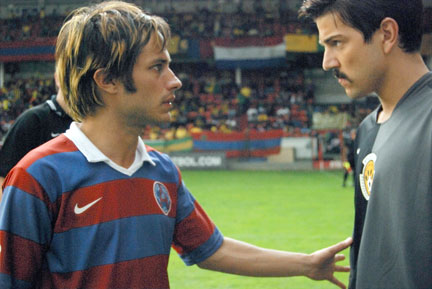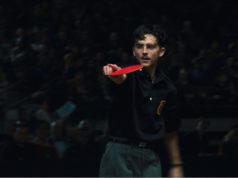It’s hard to make a sports film with real originality. How do you resist the siren call of the genre’s cliches: the tough but all-knowing coach, the supportive girlfriend, the big game? How do you avoid those traps and still deliver satisfying drama? Some of Mexico’s biggest cinematic talents take up the task in Rudo y Cursi, a soccer movie that reunites Gael García Bernal and Diego Luna, who previously co-starred in the national industry-making hit Y Tu Mamá También.
Directing them is first-time filmmaker Carlos Cuarón, the younger brother of Y Tu Mamá También‘s director Alfonso Cuarón. The pedigree of this project compels our attention. I wish I could say the same for the movie itself. Despite its integrity, it falls into some traps of its own.
 Respectively, García Bernal and Luna portray Tato and Beto Verdusco, half-brothers from rural Jalisco who scrape out a living picking bananas and spend their free time playing soccer. The surly, abrupt Beto is nicknamed “El Rudo” for his hard-nosed goalkeeping style. On the other hand, Tato is a carefree striker who acquires the nickname “Cursi” (which means “corny” or “sentimental” but can also mean “pretentious” or “artificial”) for his joyful attitude and his habit of celebrating the goals he scores by pretending to fly an imaginary kite. The story of their rise and fall is narrated by Batuta (Guillermo Francella), the sleazy talent scout/player agent who discovers them and signs them to different teams in Mexico’s Primera División. A vivid presence onscreen, Batuta is a long-winded bore as an offscreen narrator, with too many metaphors about how soccer is like life.
Respectively, García Bernal and Luna portray Tato and Beto Verdusco, half-brothers from rural Jalisco who scrape out a living picking bananas and spend their free time playing soccer. The surly, abrupt Beto is nicknamed “El Rudo” for his hard-nosed goalkeeping style. On the other hand, Tato is a carefree striker who acquires the nickname “Cursi” (which means “corny” or “sentimental” but can also mean “pretentious” or “artificial”) for his joyful attitude and his habit of celebrating the goals he scores by pretending to fly an imaginary kite. The story of their rise and fall is narrated by Batuta (Guillermo Francella), the sleazy talent scout/player agent who discovers them and signs them to different teams in Mexico’s Primera División. A vivid presence onscreen, Batuta is a long-winded bore as an offscreen narrator, with too many metaphors about how soccer is like life.
The film looks for credibility through its unsparing depiction of Mexican sports. (No wonder Cuarón had to invent fictitious teams for the Verduscos to play for.) The brothers’ lack of education leaves them unprepared for sudden wealth, as Beto falls prey to a nasty gambling habit, while Tato falls in love with a predatory, unfaithful TV presenter (Jessica Mas) and moves quickly from fan favorite to hated villain when the goals dry up. He even has a disorienting encounter with a beefy supporter of his own team who threatens him with a beating if he doesn’t score and then asks for his autograph, keeping up a stream of invective the whole time.
The sport is rife with corruption, too. Batuta gives kickbacks to coaches in exchange for playing time for his clients, and when Beto’s gambling debts pile up, he’s asked to throw a match that happens to be against Tato’s team. The suspense in the climactic big game comes from whether Beto will follow through and whether he’ll let his brother break his scoring drought.
Some humorous moments leaven the seriousness, like Batuta’s sole funny metaphor, “Starting a game on the bench is like taking your new wife on your honeymoon and being unable to have sex with her. Then you have to watch while 22 jerks and three cops have sex with her in a stadium filled with thousands of cheering fans.” (Note: This quote is my own translation. The film’s actual subtitles are weirdly rendered into British English instead of American English. It’s distracting to see these Mexican characters exchanging lines like “There’s a spare in the boot.”) The newly famous Tato, who dreams of a musical career, films a music video singing a Spanish-language version of Cheap Trick’s “I Want You to Want Me.” He’s wearing a sequined vaquero outfit and flanked by backup dancers pulling the stalest moves. By intention, this video is cheesy enough to top all the enchiladas in Mexico; it simply has to be seen to be disbelieved.
Cuarón scrupulously refuses to give us a feel-good resolution, yet the rewards for his scruples are rather paltry. None of the plot developments are terribly surprising, and the character development is strictly by-the-numbers. In a way, this film is as formulaic as the Goal! movies, though at least those turgid dramas featured extensive soccer footage. Here, the camera is never on the field during the key dramatic moments. Instead, Cuarón shows us only reactions of crowds and coaches, leaving us to learn what has happened from the TV commentators. You can’t help but think the director did this because García Bernal and Luna weren’t good enough as soccer players, and while sports filmmakers always have to struggle with actors who aren’t elite athletes, Cuarón’s perverse strategy will fool no one.
The film’s downbeat ending seems like a ploy to convince us that this movie is dealing in reality as opposed to most other sports films. Cuarón’s storytelling doesn’t show enough creativity or insight into his characters to earn that. Compare Ron Shelton’s Bull Durham and Tin Cup, or more recently, Anna Boden and Ryan Fleck’s Spanish-language baseball movie Sugar, which played at the Modern last week. These sports flicks don’t end with championship celebrations. Instead they tell us so much about their characters and the worlds they inhabit that we’re willing to follow them to their unorthodox conclusions. Next to those films, the well-intentioned Rudo y Cursi offers as much entertainment as a mediocre soccer team needing some flair and unpredictability. l











